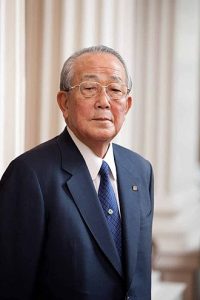This time, Inamori* spoke about the above motto in Kyocera philosophy.
What Inamori said is quoted with “”.
“ I used the phrase ‘a product so refined it could cut your hand’—and flatly refused to accept the sample he brought me.
This expression refers to a product of flawless, absolute quality.
…Thanks to this relentless pursuit of not only technical perfection but also aesthetic beauty, our semiconductor packaging business achieved great success.
…I believe it was this unwavering attitude that enabled Kyocera to grow from a small business into a mid-sized company, and from a mid-sized company into a major enterprise.
…And this spirit was not limited to products. It also applied to the behavior and presence of our employees.
Through their conduct, the company itself began to exude a refined atmosphere—a company that, metaphorically, could also be described as ‘sharp enough to cut your hand.’ “

To cultivate such dignity and integrity, Mr. Inamori emphasized the importance of living by the Kyocera Philosophy—a set of guiding principles that act like moral precepts, to be practiced every day.
Moreover, just as the Buddha taught, Mr. Inamori spoke of the need to polish one’s heart and pursue enlightenment by practicing the Six Paramitas—the six perfections of Mahayana Buddhism.
In this message, I’d like to discuss the first three of these six Paramitas, in light of insights I have gained from the study of Sanmei-gaku, the ancient Chinese art of destiny analysis based on one’s birth date.
This tradition, developed over 4,000 years ago, allows us to explore a person’s innate destiny and life path through cosmological principles.
Over the past five years, I have dedicated myself to studying Sanmei-gaku, testing its principles through observation and real-world examples to verify its empirical validity.
In this newsletter, I will apply this analytical method to Inamori’s life and examine how the first three Paramitas manifested in his journey:
1. Dana (Generosity) : A heart devoted to the service of others.
2. Sila (Discipline) : Becoming aware of one’s desires and learning to restrain them.
3. Virya (Diligence) : Committing to an effort that no one can surpass.
Let us now explore each of these in greater depth.
1. Dana (Generosity) : A heart devoted to the service of others.
“ I often speak about the concept of ‘a heart devoted to others’—which may seem, at first glance, to contradict the principles of business management.
But this selfless mindset—‘for the sake of others and society’—is, in essence, the practice of dana, or giving.
Many small and medium-sized business owners work tirelessly to protect and support their employees.
In doing so, they are dedicating themselves to the well-being of others. That, to me, is a noble form of dana. ”
→ From the perspective of Sanmei-gaku, Mr. Inamori’s destiny includes a special configuration known as Natchin (納音), which symbolizes the mission to correct the distortions or evils of society.
He founded Kyocera during Japan’s post-war economic boom—a time when labor-management conflicts were frequent and society was deeply entrenched in a “money-driven” mentality.
Yet, it was precisely this global obsession with money that Mr. Inamori was destined to confront and transform.
And indeed, through Kyocera, JAL, and the Seiwajuku leadership academy, he devoted himself to this calling.
He made it clear that a company does not exist for the benefit of shareholders or a select group of executives.
Rather, its purpose is to pursue the fulfillment of all employees—both materially and spiritually.
Very few companies in the world, past or present, have ever declared such a mission so openly and consistently as Kyocera.

2. Sila (Discipline) : Becoming aware of one’s desires and learning to restrain them.
“ The Buddha taught that we must subdue the six root afflictions—
greed (貪, ton), anger (瞋, shin), envy or ignorance (痴, chi), arrogance (慢, man), doubt (疑, gi), and false views (見, ken)—which are the source of our delusions.
To observe precepts (sila), to practice discipline, is to restrain these powerful forces. ”
→ According to Sanmei-gaku, Mr. Inamori’s destiny chart is characterized by what is called the Metal Element in Pure Form (Kinsei Ikki Kaku), a configuration that indicates great success in work and enterprise.
However, such a destiny comes with conditions.
His chart also shows an overabundance of water sources—which represent wisdom, ideas, and thinking.
But when there is too much of this “water,” it tends to become murky, clouded, and polluted.
In this context, water symbolizes one’s mindset—one’s thoughts, values, and emotional clarity.
As Mr. Inamori himself warned, success in business often causes people to forget their original intent.

Some become arrogant, indulgent in luxury, and forget the kindness or support they received from others.
Their character changes. They lose themselves.
Such is the power of success—it can easily distort the human heart.
To keep one’s heart pure, one must train harder than even the most devoted monks—continually elevating the spirit and refining the soul.
Inamori, who achieved such extraordinary success in the world of business, once reflected on his life and said:
“My life was a daily effort to elevate my philosophy.”
I believe what he meant was this:
He poured his entire being into keeping his mind clear,
so that his judgment would never be clouded,
so that his heart would remain pure.

Every time I reflect on this, I ask myself:
Is my own heart still clear?
Am I truly doing what is right?
Such self-reflection must never cease.
3. Virya (Diligence): Committing to an effort that no one can surpass.
“ This is what it means to work with wholehearted dedication.
I always tell people: ‘Make efforts much harder than anyone else.’
Even if others are sleeping, you should be working. That is the spirit of sh?jin—relentless diligence.
Zen monks endure strict discipline in order to attain enlightenment.
Whether farming, cleaning, or meditating, they give everything they have. That, too, is shojin. ”
→ In Inamori’s Jintaizu—a chart used in Sanmei-gaku to analyze one’s personality and character—there are symbols indicating a strong sense of responsibility and the ability to carry out one’s duties with unwavering conviction.
There are also stars signifying the power to hold firm beliefs and to act upon them.
I believe these aspects of his destiny underpin his philosophy of “making efforts much harder than anyone else.”
Inamori also spoke of becoming “the center of the vortex.”
Indeed, he possessed the rare power to create a large movement—a vortex—that drew others in.
He himself led by example, working harder than anyone, refining his heart through daily work.
That, I believe, inspired those around him to follow in his path, one by one.

Recently, I visited the sacred training caves used by Shugend? ascetics in Mt. Hiko, in Fukuoka Prefecture.
The journey to reach each cave was grueling. The paths were steep, nearly invisible in parts.
It made me think—Shugend? practitioners once traversed these same harsh trails as part of their spiritual training.
By walking such difficult paths, believers likely became more humble.
They gained strength to overcome hardship, and the quiet power to persevere.
Through this kind of training, one comes to revere nature, grow in humility, and develop a deep sense of gratitude for being allowed to live at all.

To sum up:
I believe that striving to elevate one’s character—through business or through one’s personal life—has the same transformative power as spiritual training.
To refine the soul while practicing business management is itself a form of discipline.
To do that, we must:
Act for the sake of others and society. (dana)
Become aware of and restrain our inner desires. (sila)
Commit ourselves fully to our work. (virya)
These are the essentials.
The remaining three Paramitas — (patience), (meditative concentration), (wisdom) —
I hope to explore in a future reflection, when the time is right.
* Mr. Kazuo Inamori, the founder of Kyocera, KDDI (one of the top tele communication companies in Japan) and the top of revitalization project of JAL. As a well-known Japanese entrepreneur, he has been sharing his experiences and management know-how with managements of small to middle companies in Japan.
Further queries or doubts, please email to ytomizuka@abrilsjp.com
News Letter subscription is here











